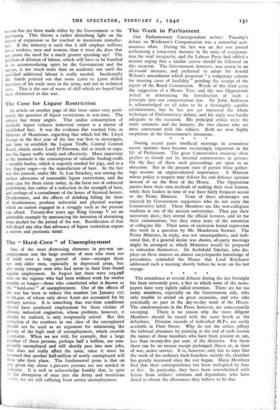The Case for Liquor Restriction
An article on another page of this issue raises very perti- nently the question of liquor restrictions in war-time. The subject has many angles. That undue consumption of alcoholic liquor reduces industrial output is a matter of established fact. It was the evidence that reached him, as Minister of Munitions, regarding that which led Mr. Lloyd George in the first year of the last war first to investigate, and later to establish the Liquor Traffic Central Control Board, which, under Lord D'Abernon, did so much to regu- late the liquor traffic wisely and effectively. More important at the moment is the consumption of valuable feeding-stuffs —notably barley, which is urgently needed for pigs, and to a less degree sugar—in the manufacture of beer. In the last war this journal, under Mr. St. Lee Strachey, was among the earliest advocates of reasonable liquor restrictions, and the same case for them exists today, in the form not of enforced prohibition, but rather of a reduction in the strength of beer, and perhaps of a curtailment of the hours of licensed houses. Drunkenness, and the effects of drinking falling far short of drunkenness, produce industrial and physical wastage which no nation engaged in a struggle such as the present can afford. Twenty-five years ago King George V set an admirable example by announcing his intention of abstaining from alcohol for the period of the war. Recollection of that will dispel any idea that advocacy of liquor restriction argues a narrow and puritanic mind.






































 Previous page
Previous page